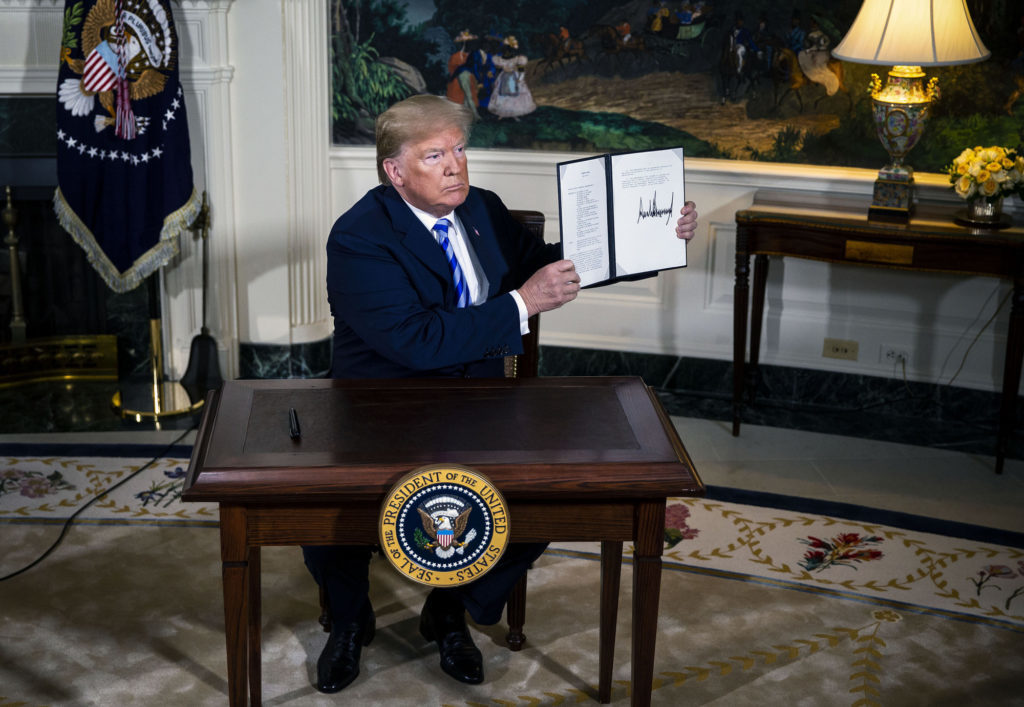
President Donald Trump’s decision to reimpose sanctions on Iran threatens to tighten global oil markets and could derail tens of billions of dollars in business deals.
But the “snap-back” of penalties on Iran isn’t immediate, instead kicking in over six months. That could allow time to negotiate a new accord to replace or supplement the deal agreed to during Barack Obama’s presidency.
Trump’s order on Tuesday blocks new contracts immediately and sets 90- and 180-day clocks for companies with existing Iranian business commitments. By August or November, they’ll have to comply with a broad array of sanctions targeting the Iranian Central Bank and Iran’s financial sector, oil industry, shipping and other economic pressure points.
Trump made clear he expects to achieve a new deal that lifts the penalties.
“The fact is they are going to want to make a new and lasting deal, one that benefits all of Iran and the Iranian people, ” Trump said. “When they do, I am ready, willing and able.”
Unless Trump is satisfied or changes course, here is what will happen:
August Sanctions
The first deadline is Aug. 6. By then, companies must wind down holdings of Iranian sovereign debt or Iranian currency. Any person or company that assists the Iranian government with acquiring or purchasing U.S. dollar banknotes also will be subject to sanctions by that date.
Sanctions also snap back into place Aug. 6 on Iran’s trade in gold and other precious metals, graphite and coal, metals such as aluminum and steel, the country’s automobile sector and luxury products such as Iranian-origin carpets and caviar.
Treasury Secretary Steven Mnuchin said in a briefing that companies can request waivers or special licenses to avoid sanctions, and they’ll be determined on a case-by-case basis.
November Sanctions
Sanctions targeting companies doing business with Iran’s oil industry are reinstated Nov. 4, including penalties against foreign financial institutions that conduct significant transactions with the Central Bank of Iran.
On top of that, the U.S. will impose sanctions on Iran’s energy sector and on petroleum-related transactions with firms including National Iranian Oil Company, Naftiran Intertrade Company, and National Iranian Tanker Company.
RBC Capital Markets chief commodities strategist Helima Croft said that “depending on the enforcement rate” she expects Iranian oil exports to be curtailed by between 200,000 and 300,000 barrels per day. By comparison, 1 million to 1.5 million barrels were removed from the market daily when the Obama administration and other world powers jointly sanctioned Iran to force it to the negotiating table before 2015.
The U.S. advised countries that want to avoid sanctions on their financial institutions to reduce their volume of crude oil purchases from Iran during the 180-day wind-down period. The State Department will determine on a case-by-case basis whether countries have sufficiently cut their Iranian imports.
More Risk Ahead
More U.S. penalties against Iran’s economy could be on the horizon.
“It’s entirely possible that additional sanctions will follow as new information comes to light,” White House National Security Adviser John Bolton told reporters in a briefing following Trump’s announcement. “And that’s something we should pursue vigorously because we want to put as much economic pressure on Iran as we can and deny them the revenues they would have gotten from the transactions we’re not eliminating.”
He didn’t specify what other industries or companies could be targeted.
Deals endangered
Trump’s announcement is likely to scuttle billions of dollars of deals even before the sanctions fully take effect. All the uncertainty will have a “potentially devastating chilling effect” on business, said Tony Blinken, a former deputy secretary of State under Obama.
Mnuchin said that Boeing Co.’s license to sell aircraft to Iran will be revoked. The company has signed a $3 billion deal for 30 737 Max jets with Iran Aseman airline and a $16.6 billion deal with national carrier Iran Air for 80 aircraft.
“That deal would be in jeopardy and thousands of jobs in various locations of the U.S. would be in jeopardy,” Jane Harman, CEO of The Woodrow Wilson International Center for Scholars and a former Democratic House member from California, said in congressional testimony on Tuesday before Trump’s announcement.
“We will consult with the U.S. government on next steps,” Gordon Johndroe, a Boeing vice president, said in a statement.
Airbus Group SE’s Iran license will also be revoked, Mnuchin said. The company has a contract with Iran for 100 jetliners worth about $19 billion at list prices. Also endangered: a 20-year, $5 billion agreement Total and China National Petroleum Corporation signed to develop part of Iran’s South Pars offshore gas field.